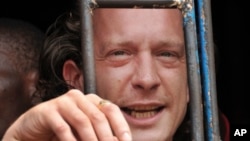KAMPALA —
David Cecil, a British citizen who produced a play last year about the plight of Ugandan gays, was deported from Uganda on Monday. He had been arrested by Ugandan police Wednesday, and was flown back to Britain after having spent five days in detention at a Kampala police station.
Cecil had angered Ugandan authorities last year by staging The River and the Mountain, in which a group of employees kills their own boss when they learn he is gay. Uganda's media council said it had not authorized the production, and Cecil was imprisoned for several days. A Ugandan court threw the case out in January, citing a lack of evidence.
But authorities detained him again this month, and put him on a plane out of the country Monday evening.
The Ugandan government claims the right to deport immigrants it considers “undesirable.” But according to human rights lawyer Ladislaus Rwakafuuzi, someone can only be deemed undesirable if he or she has broken the law.
“If there has been a conviction, the executive has the discretion to say that the person is not wanted because of his criminal record. Without any proof of a crime and without any proof of a breach of immigration laws, the person is protected by our constitution, which strictly says people are free to move within Uganda,” said Rwakafuuzi.
Homosexuality is already illegal in Uganda, and widely condemned. But Cecil’s deportation comes as the Ugandan parliament prepares to debate a strict new anti-homosexuality bill.
If it passes, the bill would criminalize “promotion” of homosexuality and failure to report it, and it may still include a clause making certain homosexual acts punishable by death.
Rwakafuuzi says an unconstitutional deportation such as Cecil’s amounts to harassment.
“It was done in bad faith, it amounts to harassment of this very person who came here to say something, to invite us to debate. The government acted outside of the law. There is no single law government can cite," said Rwakafuuzi.
Cecil’s deportation came suddenly, before his legal team had time to prepare an appeal. The official reasons for the move have not been made public, and immigration officials were not available for comment.
Cecil was running a cultural center in Kampala, and has two young children with his Ugandan girlfriend.
Cecil had angered Ugandan authorities last year by staging The River and the Mountain, in which a group of employees kills their own boss when they learn he is gay. Uganda's media council said it had not authorized the production, and Cecil was imprisoned for several days. A Ugandan court threw the case out in January, citing a lack of evidence.
But authorities detained him again this month, and put him on a plane out of the country Monday evening.
The Ugandan government claims the right to deport immigrants it considers “undesirable.” But according to human rights lawyer Ladislaus Rwakafuuzi, someone can only be deemed undesirable if he or she has broken the law.
“If there has been a conviction, the executive has the discretion to say that the person is not wanted because of his criminal record. Without any proof of a crime and without any proof of a breach of immigration laws, the person is protected by our constitution, which strictly says people are free to move within Uganda,” said Rwakafuuzi.
Homosexuality is already illegal in Uganda, and widely condemned. But Cecil’s deportation comes as the Ugandan parliament prepares to debate a strict new anti-homosexuality bill.
If it passes, the bill would criminalize “promotion” of homosexuality and failure to report it, and it may still include a clause making certain homosexual acts punishable by death.
Rwakafuuzi says an unconstitutional deportation such as Cecil’s amounts to harassment.
“It was done in bad faith, it amounts to harassment of this very person who came here to say something, to invite us to debate. The government acted outside of the law. There is no single law government can cite," said Rwakafuuzi.
Cecil’s deportation came suddenly, before his legal team had time to prepare an appeal. The official reasons for the move have not been made public, and immigration officials were not available for comment.
Cecil was running a cultural center in Kampala, and has two young children with his Ugandan girlfriend.




